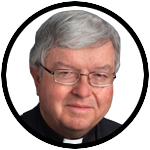
Father Kenneth Doyle
Q. In certain parts of our country, they are allowed to have the Mass of Christian Burial at funeral homes. I think this is a wonderful idea, especially for small funerals. Who makes that decision or gives permission for this? (Upstate New York)
A. I am not aware of any place in the U.S. where funeral Masses are celebrated on a regular basis in the funeral home. The Archdiocese of Detroit notes, for example, on its website: “Funeral Masses are not allowed in funeral homes. The funeral liturgy outside of Mass, as provided in the ‘Order of Christian Funerals,’ is allowed in the funeral home.”
That ritual held in a funeral home, then, would consist only in the sprinkling of the casket, opening prayers, scriptural readings, a homily, intercessory petitions, the Our Father and the closing prayers of commendation. In short, this service would include all of the parts of a normal funeral Mass with the significant exception of the Eucharist itself.
[hotblock]
It is much more fitting that a funeral be celebrated with the church’s central and most powerful prayer, the Eucharist — ordinarily in the parish church in which the deceased had traditionally worshipped.
At the same time, though, this guideline is not absolute, and a local bishop could grant permission for a Mass to be celebrated in the funeral home — particularly in rural areas, where the church might be a great distance away, or in a case where severe weather might imperil travel.
Q. I am very concerned about the explosive population growth in the world, and about religious leaders not addressing it. I know that as Catholic Christians we are called to support the poor here and overseas, and I have done this. But with unlimited population growth, isn’t this like bailing water from a boat with a hole in the bottom?
Why aren’t religious leaders encouraging families to limit size? There are only so many natural resources and acres of land. How can some parents have nine or 10 children, knowing that some of them will die from starvation or disease? (Toms River, New Jersey)
[tower]
A. The concern you express resonates with the words of Pope Francis. Speaking to journalists during a flight in January 2015 from the Philippines back to Rome, the pontiff addressed that same question, indicating that Catholics fail to practice responsible parenthood when they have more children than can be provided for.
While defending the stance against artificial contraception taken by Pope Paul VI in the encyclical “Humanae Vitae,” Pope Francis said that “this doesn’t mean a Christian should have a succession of children.” “Some people believe that,” he added, “in order to be good Catholics, we should be like rabbits.”
Rejecting that myth, he noted that there are legitimate natural ways to limit reproduction and cited with disapproval the case of a woman who became pregnant an eighth time after giving birth to seven children by cesarean section. “Do you want to leave seven orphans?” the pope asked. “This is tempting God.”
Consistently the church has acknowledged the dangers posed by increased poverty rates in the fastest-growing regions of the world; it has urged prudent decision-making in the spacing of births, but has situated that choice in the consciences of parents themselves, rejecting efforts by some governments to act by force through programs of artificial contraception, sterilizations and even abortions.
In April 2015, the Pontifical Academy of Sciences asserted that there is a determinable level of sustainable world population and that the common good requires maintaining that number.
Two months later, though, in his encyclical “Laudato Si’,” Pope Francis offered a more nuanced and comprehensive view, saying, “Instead of resolving the problems of the poor and thinking of how the world can be different, some can only propose a reduction in the birth rate … To blame population growth instead of extreme and selective consumerism on the part of some is one way of refusing to face the issues” (No. 50).
***
Questions may be sent to Father Kenneth Doyle at askfatherdoyle@gmail.com and 30 Columbia Circle Dr., Albany, New York 12203.
PREVIOUS: Advent calls us to prepare for the Lord’s many comings
NEXT: Humility not about being polite, but accepting humiliation, pope says



Share this story